Maaveerar Naal
by Nadesan Satyendra, TamilNation.org, November 26, 2006
|
And so it is that both US and New Delhi (at present) deny the right of the people of Tamil Eelam to be free of alien Sinhala rule. They would deny the record which proves that during the past fifty years and more, the intent and goal of all Sinhala governments (without exception) has been to secure the island as a Sinhala Buddhist Deepa. They would deny that rule by a permanent ethnic majority within the confines of a single state is the dark side of 'democracy'. They would deny that the Sinhala Buddhist nation masquerading as a multi ethnic 'civic' 'Sri Lankan' nation set about its task of assimilation and 'cleansing' the island of the Tamils, as a people...
|
 ??????? ??????? ???????????... ??????? ??????? ???????????...
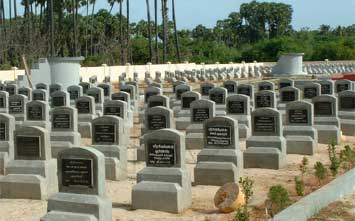
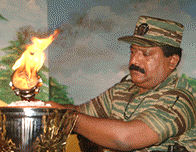 Today is the 52nd birthday of Velupillai Priabakharan - a leader who has become the living symbol of the Tamil Eelam struggle for freedom from alien Sinhala rule. And, tomorrow is Maaveerar Naal. It is a day when hundreds of thousands of Tamils living in many lands will bow their heads in silence, even if only for a few moments - and remember those of their brothers and sisters, their ‘udan pirapukal’, who have given their lives in that so that we may live in freedom and with dignity - in Tamil we say thanmaanam, ????????. Today is the 52nd birthday of Velupillai Priabakharan - a leader who has become the living symbol of the Tamil Eelam struggle for freedom from alien Sinhala rule. And, tomorrow is Maaveerar Naal. It is a day when hundreds of thousands of Tamils living in many lands will bow their heads in silence, even if only for a few moments - and remember those of their brothers and sisters, their ‘udan pirapukal’, who have given their lives in that so that we may live in freedom and with dignity - in Tamil we say thanmaanam, ????????.
However, we do not seek to glorify war because we know too well the pain and suffering that war brings in its trail. Neither do we seek to glorify our war heroes. To glorify is to boast and magnify. And we do not seek to boast or magnify. But we do seek to remember, honour and mourn our war dead - remember with gratitude, honour with humility and mourn from deep within our hearts. Tomorrow is a day of remembrance. It is also a day of re-dedication by the many, who may not have put their lives at risk, but who nonetheless identify themselves with the cause for which their brothers and sisters in Tamil Eelam have given their lives - a struggle for freedom from alien Sinhala rule. It is a day of re-dedication which will reflect the settled determination of Tamils living in many lands and across distant seas, as far apart as Australia, South Africa, London, U.S.A., Canada, Switzerland, France, Denmark, Italy, Norway, Netherlands, Sweden, Singapore, Malaysia, Germany and Tamil Nadu to preserve their national identity and to live as a free people - a national identity, rooted in a shared heritage, in a vibrant culture, a rich language and literature and consolidated by struggle and suffering.
".. to have suffered, worked, hoped together; that is worth more than common taxes and frontiers conforming to ideas of strategy... I have said 'having suffered together'; indeed, common suffering is greater than happiness. In fact, national sorrows are more significant than triumphs because they impose obligations and demand a common effort. .. A nation is a grand solidarity constituted by the sentiment of sacrifices which one has made and those that one is disposed to make again. " (Ernest Renan: Que'est-ce qu'une Nation? Paris 1882)
The pain and suffering of the people of Tamil Eelam and their struggle for freedom has served to cement the growing togetherness of more than seventy million Tamil people - a nation without a state.

is an aspiration which has found an answering response in the hearts and minds of Tamils living in many lands and across distant seas. Tamil Eelam is without the resources that a full fledged state may command. The people of Tamil Eelam can only turn to their ‘udan pirapukal’ in many lands - the Tamil diaspora is the hinterland for the struggle for justice and freedom in Tamil Eelam. Some 18 years ago, in April 1988, at a time when the struggle for Tamil Eelam was confronted with the occupying forces of a foreign army, Velupillai Pirabaharan, the leader of Tamil Eelam sent a message to an international Tamil Conference in London:
"In view of this grim situation facing the people of Tamil Eelam, it is the national duty and solemn responsibility of all the Tamil patriots living abroad to organise and mobilise themselves into a powerful international voice of reason to fight for the redemption of their motherland caught in a monumental historical tragedy. The patriotic Tamil intelligentsia, living abroad should lead an effective global campaign to stir the conscience of the civilised world about this tragic human conditions of betrayal and oppression. We fervently hope that the international Tamil community will understand and support wholeheartedly, the determined struggle of our liberation movement to fight for the cause of justice for our oppressed people."
Today, 18 years later, the people of Tamil Eelam face another grim prospect. The Sinhala Sri Lanka government headed by President Rajapakse is pursuing with ruthlessness and renewed vigour, the decades old Sinhala assimilative agenda by reneging on the 2002 Oslo Declaration, by refusing to recognise the existence of the Tamil homeland, and by perpetuating a Sri Lankan state structure within which the Tamil people may continue to be ruled by a permanent Sinhala majority.
The genocidal intent of the Sinhala government is reflected in the war crimes committed by the armed forces under the President Rajapakse's command. In the shadow of a ceasefire, they have raped, murdered Tamil Parliamentarians, Tamil journalists, executed Tamil students with impunity, arbitrarily arrested and detained Tamil civilians, abducted Tamil refugee workers, orchestrated attacks on Tamil civilians and Tamil shops, bombed Tamil civilian population centres and displaced thousands of Tamils from their homes.
And the Tamil people know that many foreign governments have not only simply looked the other way but have also lent their tacit and overt support for the actions of the Sinhala Sri Lanka government. These foreign governments do so, not because they are unaware of the continuing suffering and pain of the people of Tamil Eelam in Jaffna and in the Vanni. They do so, not because they do not know that the use of food as a weapon of war is a war crime. They do so, not because the efforts of the Tamil people to make known to the world the suffering and pain of their brothers and sisters in Tamil Eelam, have failed. They do so, not because these governments are so foolish as to be 'misguided' by Sri Lanka's propaganda and 'diplomacy' - after all most governments have their own sources of reliable information, together with the capacity to sift the information that they receive. They do so, because the question is not so much a matter of human rights, humanitarian standards and justice but a matter of real politick.
Here, it is not only the Indian sub continent but also the Indian Ocean (Trincomalee as well as the Arabian Sea) that has assumed a vital strategic importance in international relations in this age of empire. And so today, as the Tamil Guardian has rightly pointed out, Sri Lanka's strategy of terror has international backing. The efforts of foreign governments are directed not so much to secure 'justice' for the people of Tamil Eelam, or for that matter to simply 'stabilise' Sri Lanka but to 'stabilise' each of their own positions and influence in Sri Lanka and in that way in the Indian Ocean region. The US and India find common cause in weakening the LTTE - but weaken it in such a way that thereafter each of them may successfully jockey for position and influence in the Indian region.
The political reality is that the US is mindful that it was after all President Jayawardene's 'growing togetherness' with the US which led to New Delhi's support of the Tamil militant movement in the early 1980s. At that time the US kept its oars in Tamil waters with efforts such as hoisting the Eelam flag in the State of Massachusetts. Today, the same US continues to speak of the 'legitimate grievances' of the Tamil people. It was this 'twin track' approach which the Press Trust of India (PTI) correspondent, Sridhar pointedly emphasised in his questions to US Under Secretary of State, Burns at the Tokyo Donors Co-Chairs Press Conference in Washington on 21 November 2006 -
1.Sir, there has been a lot of writing in the media that there is somehow two different tracks of U.S. policy towards this conflict in Sri Lanka. The hard line espoused by Mr. Burns supposedly is for allowing military offensives for the state of Sri Lanka to preserve the territorial integrity. And supposedly there is a softer line that is pushing for the homeland, you know, of the Sri Lankan Tamils. Can you please clarify for the record what it is that the U.S. is pushing there now in Sri Lanka?
2. What military assistance does the United States provide to the Government of Sri Lanka and whether any of the arms have been used by the government troops in alleged atrocities?
The PTI questions also reflected New Delhi's concern to secure its own ability to continue to play the 'Tamil card' and keep Sri Lanka in line in the years to come - even after the successful removal of Velupillai Pirabakharan and the weakening of the LTTE. And so New Delhi too proclaims ad nauseam that they are concerned to secure the 'legitimate aspirations' of the Tamil people. Additionally it builds its own network amongst dissident Tamils both in Sri Lanka and abroad to secure its foothold in the island of Sri Lanka.
And so it is that both US and New Delhi (at present) deny the right of the people of Tamil Eelam to be free of alien Sinhala rule. They would deny the record which proves that during the past fifty years and more, the intent and goal of all Sinhala governments (without exception) has been to secure the island as a Sinhala Buddhist Deepa. They would deny that rule by a permanent ethnic majority within the confines of a single state is the dark side of 'democracy'. They would deny that the Sinhala Buddhist nation masquerading as a multi ethnic 'civic' 'Sri Lankan' nation set about its task of assimilation and 'cleansing' the island of the Tamils, as a people, by
- depriving a section of Eelam Tamils of their citizenship,
- declaring the Sinhala flag as the national flag,
- colonising parts of the Tamil homeland with Sinhala people,
- imposing Sinhala as the official language,
- discriminating against Tamils students seeking University admission,
- depriving Tamil language speakers of employment in the public sector,
- dishonouring agreements entered into with the Tamil parliamentary political leadership,
- refusing to recognise constititutional safeguards against discrimination,
- later removing these constitutional safeguards altogether,
- giving to themselves an authocthonous Constitution with a foremost place for Buddhism,
- and changing the name of the island itself to the Sinhala Buddhist name of Sri Lanka - appropriately enough, on the 'tenth day of the waxing moon in the month of Vesak in the year two thousand five hundred and fifteen of the Buddhist Era'
They would ignore the political reality that when these attempts at ethnic cleansing were resisted by the Tamil people by non violent means and parliamentary struggle, Sinhala governments resorted to violence in 1956, in 1958, in 1961 and again in 1977 - a murderous violence directed to terrorise the Tamils into submission.
They would deny the lawfulness of Tamil armed resistance, which arose as a last resort against continuing State terror. They would ignore the political reality that that lawful resistance of the Tamil people was met with enactment of laws which were an 'ugly blot on statute book of any civilised country', with arbitrary arrest and detention, torture, extra judicial killings and massacres, indiscriminate aerial bombardment and artillery shelling, wanton rape, and genocide - together with press censorship, disinformation and murder of journalists. They would deny that the impunity granted to Sinhala armed forces, para military groups, goondas and Sinhala thugs, proved beyond doubt the encouragement, support and direction given by successive Sri Lanka governments for the crimes committed against the Tamil people.
They would suggest to the people of Tamil Eelam that they should be satisfied with ‘autonomy’, ‘devolution’, and perhaps ‘pseudo federalism, even though the Sinhala political parties cannot agree amongst themselves as to the extent of that devolution and even though under any such dispensation Sinhala majority rule will continue from the centre and the Sinhala armed forces will continue as the ultimate repository of the coercive power of a Sinhala dominated Buddhist state. They would deny that to work for the flowering of an independent Tamil Eelam is to bring forward the emergence of a true trans nationalism and that a true trans nationalism will come only from nationalisms that have flowered and matured - and that it will not come by the suppression of one nation by another.
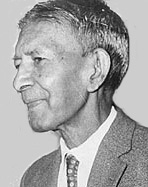 They would deny the historical reality that throughout the ages the Sinhalese and Tamils in the country lived as distinct sovereign people till they were brought under foreign domination in 1833. They would deny the force of reason in that which Gandhian Tamil leader S.J.V.Chelvanayagam declared in 1975 - They would deny the historical reality that throughout the ages the Sinhalese and Tamils in the country lived as distinct sovereign people till they were brought under foreign domination in 1833. They would deny the force of reason in that which Gandhian Tamil leader S.J.V.Chelvanayagam declared in 1975 -
"Throughout the ages the Sinhalese and Tamils in the country lived as distinct sovereign people till they were brought under foreign domination. It should be remembered that the Tamils were in the vanguard of the struggle for independence in the full confidence that they also will regain their freedom. We have for the last 25 years made every effort to secure our political rights on the basis of equality with the Sinhalese in a united Ceylon. It is a regrettable fact that successive Sinhalese governments have used the power that flows from independence to deny us our fundamental rights and reduce us to the position of a subject people. These governments have been able to do so only by using against the Tamils the sovereignty common to the Sinhalese and the Tamils. I wish to announce to my people and to the country that I consider the verdict at this election as a mandate that the Tamil Eelam nation should exercise the sovereignty already vested in the Tamil people and become free."
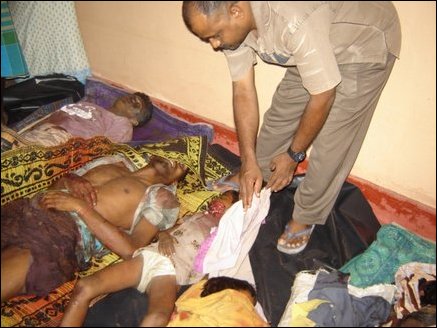
Vaharai, November, 2006 |
They would deny that the people of Tamil Eelam are subject to rule by an alien Sinhala people and they assert that universal franchise affords every Tamil the right to vote. They would ignore the political reality that during the past 50 years and more, ethnic identity has in fact determined the way in which both the Sinhala people and the Tamil people have exercised their political right of universal franchise and that during this period, no Tamil has ever been elected to a predominantly Sinhala electorate and no Sinhalese has ever been elected to a predominantly Tamil electorate - apart, that is, from multi member constituencies. They choose to ignore the political reality that the practice of 'democracy' within the confines of one state has led to rule by a permanent Sinhala majority.
They continue to speak of a ‘multi ethnic plural society’ though no such society exists in Sri Lanka. In the 1980’s when the Tamil people cried out against the murderous onslaught by President J. R. Jayawardene’s Sri Lanka, they chose to call Sri Lanka ‘an open, working, multiparty democracy’. But in October 1998, Sri Lanka President Chandrika Kumaratunga facing growing expressions of support from Tamils in South Africa, found it politically expedient to admit in a TV interview in that country:
"Mr. J. R. Jayawardene ... believed that he could use violence against the Tamil people and solve the problem in the same way he used violence continuously against our people, Sinhala people and all other Sri Lankan people as a solution to all political problems. The Tamil people were attacked 4 times between 77 and 83, physically attacked, bodily attacked, their properties destroyed. 1983 was of course, the high water mark of this anti-Tamil violence practised by the UNP - horrendous crimes were committed against the Tamil people."
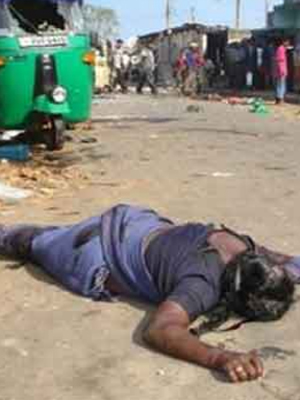
Trincomalee, April 12-15, 2006 |
Notwithstanding President Chandrika Kumaratunga's admissions, governments which characterised Sri Lanka as ‘an open, working, multiparty democracy’ in the 1980s, continue the charade today. They choose to ignore the well documented record of the genocidal war launched by Sri Lanka, the Chemmanis, the Vaharais, the Vallipunams, the Mandaithivus, the Pesalais, and the rapes and they continue to proclaim their friendship and support for the Sri Lanka government -
"... the Sri Lankan people and government are a good friend to the United States. We support the government. We have a good relationship with the government. We believe the government has a right to try to protect the territorial integrity and sovereignty of the country. The government has a right to protect the stability and security in the country... " US Under Secretary of State, Burns at Press Conference on Tokyo Donors Conference, 21 November 2006
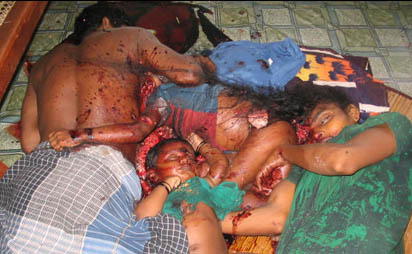
Vankalai, June 9, 2006 |
They find it expedient to ignore the constitutional reality of a Buddhist Sri Lankan state and the political reality of a belligerent Sinhala Buddhist fundamentalism - in the same way as they found it expedient to ignore the murderous violence of other "good friends" such as the Shah of Iran and President Pinochet of Chile. They would deny that the people of Tamil Eelam constitute a ‘people’ entitled to freedom, though that view has found support amonst many non governmental organisations. They would deny the right of the people of Tamil Eelam to freely determine their political status - in the same way as many of them denied, for centuries, the right of a colonial people to secure freedom from alien rule. They would deny the force of reason in the words of Professor Margaret Morre in Normative Justifications for a Liberal Nationalism -
"...The problem in nationally divided societies is that the different groups have different political identities, and, in cases where the identities are mutually exclusive (not nested), these groups see themselves as forming distinct political communities. In this situation, the options available to represent these distinct identities are very limited, because any solution at the state level is inclined to be biased in favour of one kind of identity over another. That is to say, if the minority group seeks to be self-governing, or to secede from the larger state, increased representation at the centre will not be satisfactory. The problem in this case is that the group does not identify with the centre, or want to be part of that political community...One conclusion that can be drawn is that, in some cases, secession/partition of the two communities, where that option is available, is the best outcome overall. .."
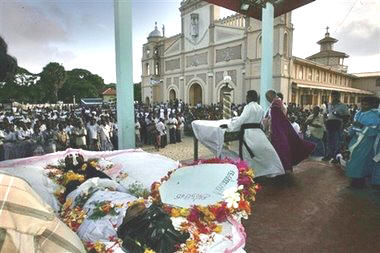
Pesalai, June 17-18, 2006 |
They would deny reason, not because hey do not recognise reason. They deny reason so that they may advance their own perceived self interests in the Indian Ocean region by supporting their 'good friends' - even if that be at the price of the pain, and suffering of the people of Tamil Eelam.
And where they cannot any longer ignore, with any credibility, the terrorism of the Sri Lanka government, they adopt the PR technique of minimising the abuses, and talk about the conflict as a 'complex' two sided story, and play up efforts at reform. Some even have the temerity (in Tamil we say ??????) to assert that -
"We... hold the Tamil Tigers responsible for much of what has gone wrong in the country. We are not neutral in this respect. " US Under Secretary of State, Nicholas Burns at Press Conference on Tokyo Donors Conference, 21 November 2006
They believe that by their support for Sri Lanka's strategy of terror, the Tamil people will be 'encouraged' to submit to alien Sinhala rule within the existing state boundaries of Sri Lanka, that Tamil national consciousness will be 'tamed' and Velupillai Pirabaharan will disappear as a ‘bad dream’. It is not that they are unmindful of Aurobindo’s words in 1907 on ideas such as freedom:
"... A feeling or a thought, the aspiration towards liberty, cannot be estimated in the terms of concrete power, in so many fighting men, so many armed police, so many guns, so many prisons, such and such laws, ukases, and executive powers. But such feelings and thoughts are more powerful than fighting men and guns and prisons and laws and ukases. Their beginnings are feeble, their end is mighty. But of despotic repression the beginnings are mighty, the end is feeble..."
They are mindful. And so their support for Sri Lanka's strategy of terror is coupled with a concerted effort to undermine the ideological strength of a struggle for freedom by labelling it 'terrorism' and then demonising its leaders.
'The surprising success of the decolonization wars can only be explained by the following: The weak seem to have defeated the strong, but actually just the reverse was true from a moral point of view, which brings us to the conclusion that limited wars are primarily fought on the field of morale.' In order for... states to quickly and effectively wipe out "revolt", which could get out of hand despite technical superiority (read: better weapons) due to the political and moral convictions of the mass movement, it is necessary to... take effective action in the psychological arena...The central aim of this defence approach is to destroy the morale of the insurgent movement ... Defaming the insurgents as "terrorists" and punishing them accordingly - thereby ignoring international law concerning the rights of people in war - is a particularly useful means." Michael Schubert 'On Liberation Movements And The Rights Of Peoples',1992
They deliberately obfuscate by conflating the words 'terrorism' and 'violence' and they avoid addressing the question whether there are any circumstances under which a people ruled by an alien people can, in law, resort to arms to secure freedom. And, if there are such circumstances what are such circumstances? Recognising the ideological strength of a struggle for freedom they call upon the people of Tamil Eelam to forget any aspiration that they may have to be free from alien Sinhala rule - and seek to lead them down the slippery slope of devolution to village panchayats. One British Conservative Party M.P. frankly remarked on a visit to Sri Lanka that ‘somebody should sit alongside Pirabaharan and tell him that a separate state is just not on.’ It was a remark that was almost on par with the comment of Winston Churchill, who expressed his concern in the 1930’s about a ‘half naked fakir (Mahatma Gandhi) parleying with the King’s Ministers' and who later, when he became British Prime Minister, asserted that ‘he had not been appointed as the King’s First Minister to preside over the liquidation of the British Empire’.
Notwithstanding such sentiments, empires weakened by two world wars, did liquidate themselves in the face of the enduring strength of struggles for freedom. If Mahatma Gandhi or for that matter Netaji Subhas Chandra Bose had been asked in the early 1930s as to when India would be free, they may well have replied: "We cannot say. The British Empire is the strongest the world has seen. But, if every Indian without exception stood up and declared openly, steadfastly and fearlessly that the demand for an independent and free India was not negotiable, the British will be unable to rule. When there are no quislings and collaborators amongst us, we will be free. The answer to the question, when we will be free, therefore lies in our own hands." They may have even added -

In
the same way as the struggle for an India free from alien British rule was not negotiable, the struggle for an independent Tamil Eelam, free from alien Sinhala rule is also not negotiable. The struggle for Tamil Eelam is not about securing ‘benevolent’ Sinhala rule. It is about freedom from alien Sinhala rule and the removal of the occupying Sinhala armed forces from the Tamil homeland. It is for that freedom, that thousands of Tamils have given their lives. And, it is those thousands of Tamils that we, their brothers and sisters, their ‘udan pirapukal’, will remember and honour tomorrow on Maaveerar Naal - with bowed heads, as we re dedicate ourselves to the cause for which they gave their lives.
|
 Home
Home Archives
Archives Home
Home Archives
Archives